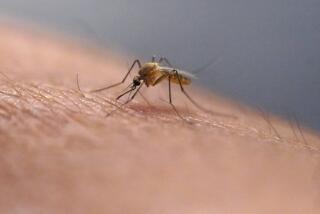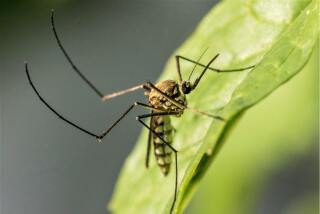Brain-infecting parasite found in two L.A. County residents: What to know about ‘racoon roundworm’

Two people in Los Angeles County are sick with a rare parasitic infection known as “raccoon roundworm,” according to officials.
The parasite, called Baylisascaris procyonis, was found in the South Bay, according to a Los Angeles County Department of Public Health news release. The parasite can infect the brain, spinal cord and eyes and lead to eye disease and swelling of the brain.
No further information was provided about the two people who were infected, including their current condition.
The risk to the general public is low at this time and the infection is rare; however, the news is still concerning because the infection rate in raccoons is high and a large number of raccoons live near people, officials said.
People can become infected if they ingest soil, dirt, water or other material contaminated with raccoon feces, which could contain roundworm eggs. The infection can’t be transported from person to person.
Dogs and cats can also become infected if they come into contact with contaminated materials; cats can’t transmit the disease and dogs rarely do.
“Our health is closely linked to the health of animals around us,” said Muntu Davis, Los Angeles County Health Officer, said in the news release. “Simple precautions, like washing your hands regularly, avoiding direct contact with wild animals and their waste, keeping pets healthy, and preventing wildlife from sheltering or living in or next to our homes or properties can help keep our neighborhoods and families safe and healthy.”
Adults older than 65, children, pregnant people and people with weakened immune systems have a higher risk of becoming seriously ill.
Officials have encouraged people to always wash their hands, be aware of zoonotic diseases, avoid animal bites and scratches, keep wildlife away, remove animal waste, not touch dead wildlife, handle food safely and keep their pets safe.
More to Read
Sign up for Essential California
The most important California stories and recommendations in your inbox every morning.
You may occasionally receive promotional content from the Los Angeles Times.











